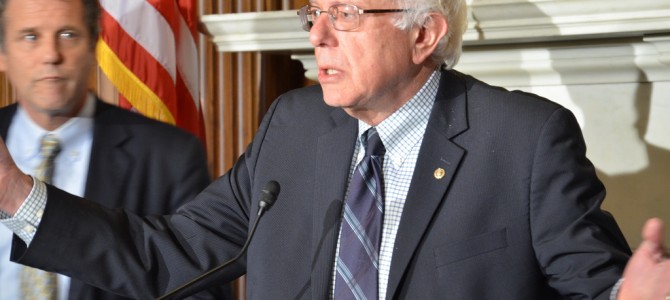
Bernie Sanders has made ending “mass incarceration” a big part of his campaign. We have too many people in prison, he says, and we don’t invest enough in communities. On July 15, Sanders spoke in support of an education bill: “The result of kids not being in school and kids not having jobs is that tragically, today, we in this country have more people in jail than any other country on Earth.”
He tweeted similar thoughts in September.
We need to end the tragic reality that the United States has more people in jail than any other country on earth.
— Bernie Sanders (@SenSanders) September 28, 2015
But is this stated aspiration just more empty words?
Sanders Votes to Lock ‘Em Up
Twenty-one years ago, Sanders was saying very much the same thing before voting for bills that caused the prison population to skyrocket. In Congress on April 13, 1994, in a speech a Sanders supporter shared at the Daily Kos, Sanders denounced America’s prison system and blamed crime on poverty.
But it is also my view that through the neglect of our Government and through a grossly irrational set of priorities, we are dooming tens of millions of young people to a future of bitterness, misery, hopelessness, drugs, crime, and violence. And Mr. Speaker, all the jails in the world, and we already imprison more people per capita than any other country, and all of the executions in the world, will not make that situation right. We can either educate or electrocute. We can create meaningful jobs, rebuilding our society, or we can build more jails.
That was April 13, 1994. After uttering those words, Sanders went on to vote for the Violent Crime Control and Law Enforcement Act (1994) and the Ominibus Crime Bill of 1994, a hallmark of Bill Clinton’s “tough on crime” agenda.
The Violent Crime Control and Law Enforcement Act of 1994 passed the House just one week after Sanders made his impassioned speech, and Sanders voted for it. That act called for expanding the application of the death penalty on many more crimes, including large-scale drug trafficking. It also included a federal version of the “three strikes law,” requiring a mandatory life sentence for anyone convicted of a third serious crime.
That version of the bill ultimately didn’t become law, but instead a similar bill, the Omnibus Crime Bill, which not only expanded the death penalty but also decreased the minimum age for minors to be tried as adults, passed the House, once again with Sanders’ vote, and became law.
Does Sanders Want Longer Sentences Or Not?
Most significantly, it included incentives for states to adopt truth-in-sentencing (TIS) laws that lengthened prison sentences. The bill provided money, with strings attached, for states to build more prisons, but only if they required that convicts for the most serious crimes would have to serve at least 85 percent of the sentences imposed on them (the “85 percent rule”). That might be a good policy if you want to make criminals serve a requisite amount of time for the injuries they inflict on individuals and society. It will, however, increase the size of the prison population by doing just that.
According to a report by the Bureau of Justice Statistics, 27 states and the District of Columbia applied TIP standards that met the Clinton administration’s standards. The average sentence served under those standards would increase from 45 months in prison for violent offenders released in 1996 to 88 months for those convicted in 1996. A chart shows the number of prisoners in state prisons sentenced to mandatory 85 percent sentences increased from less than 20,000 in 1994 to more than 40,000 the next year with the passage of the bill.
Prisoners serving longer sentences means that at any given time there will be more people in prison. The report found that the number of prisoners in state prisons increased by 7 percent annually between 1990 and 1997, even as the rate of new prisoners admitted dropped.
Then in 1998, Sanders voted again to increase the length of sentences criminals must serve. The Minimum Sentences for Gun Crimes act that passed House would have set a mandatory minimum of 10 years for crimes committed while in possession of a gun, 15 years for crimes committed while brandishing a gun, and 20 years for crimes committed while firing a gun. In the final version of the bill, the length of the sentences were cut in half.
Actions Speak Louder than Words
At the same time, Sanders voted against a bill that would have “demilitarized” the police. The Local Government Law Enforcement Block Grants Act of 1995, sponsored by Rep. Bill McCollum (R-Florida), called for establishing drug courts and prohibited local governments from purchasing tanks or armored personnel carriers.
When the police responded to protests that morphed into riots in Ferguson, Sanders said they looked like “an occupying army.” “I think we gotta rethink a lot this heavy equipment that police departments around the country are utilizing,” he told MSNBC’s Ed Schultz.
Later on in his career Sanders did vote against some bills aimed at increasing criminal sentences. In 1999, he voted against the Juvenile Justice bill, which established minimums for selling guns to kids. He also voted against the Unborn Victims Violence Act of 1999 (sponsored by fellow presidential candidate Lindsey Graham), which would have added additional charges for attacks on a pregnant woman that resulted in injury to the fetus.
FeelTheBern.org, an independent website supporting Bernie, says, “Bernie has been a long-time critic of our justice system’s over-reliance on incarceration,” and while that may be true, he hasn’t done enough besides critiquing. If he turns criminal justice into a false choice between “educat[ing] or electrocut[ing],” his record shows he has come down on the side of electrocuting. He may be right that the number of inmates in the United States has quadrupled since 1980, and he was part of the reason.









